From an Eastern Screech Owl in Wilder on January 1st to a Snowy Owl in Bridport on December 31st, Vermont birders scoured fields and fens, mountains and meadows, lakes and lawns to discover as many bird species as possible during the 7th annual Vermont eBird County Quest.
The annual year-long contest pits county versus county, birder against birder — all engaged in a friendly rivalry for top birding honors. The main idea behind the year-long Quest is simply to get people out birding, promote camaraderie, and better document bird life across the state, using Vermont eBird.
2017 marked the 14th year for Vermont eBird, the first state or provincial portal for eBird. In just a decade-and-a-half, the checklists that bird watchers have shared have helped make Vermont eBird, a project of the Vermont Atlas of Life, the largest citizen science biodiversity project in the state and around the world. 6,846 Vermont eBirders have submitted nearly 262,000 complete checklists, representing all 384 species of birds ever reported from Vermont. We’ve added over 26,000 images and over 1,200 sound recordings to Vermont checklists creating an incredible open access resource.
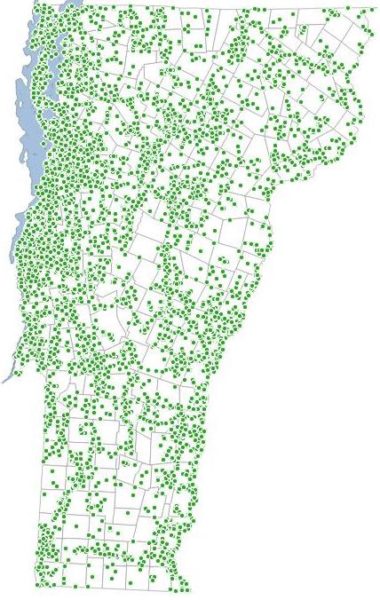
All the locations where birds were reported to Vermont eBird in 2017. Only three towns out of 251 did not have a bird reported (Warren’s Gore, Avery Gore, Andover).
GREEN MOUNTAIN BIRDERS PUT UP BIG NUMBERS IN 2017
With nearly 40,000 complete checklists submitted to Vermont eBird, comprising over 300,000 bird records, representing 281 bird species, and tallied by 1,732 birders in 2017, there is no doubt it was another banner year for birders and Vermont eBird.
COUNTY CUP CHAMPIONS
Franklin County, once an under-birded underdog, topped the field for the 4th year in a row and claimed the 2017 Quest Cup with a record score of 34.5 birds over par. Lamoille County, another under-birded county, surged this year and tied Chittenden for second place with 23.5 over par.
The County Cup award is based on a carefully calculated “par” system, realizing that not all Vermont counties are created equal in terms of avian diversity. Par scores reflect the number of species that a given county should find in a year with consistent birding effort. Each year a particular county wins, 5 birds are added to their par.
Rich in birders and species, Chittenden County had the highest number of bird species found (248). Their perennial rival Addison County tied for second place with Franklin County at 242 species.
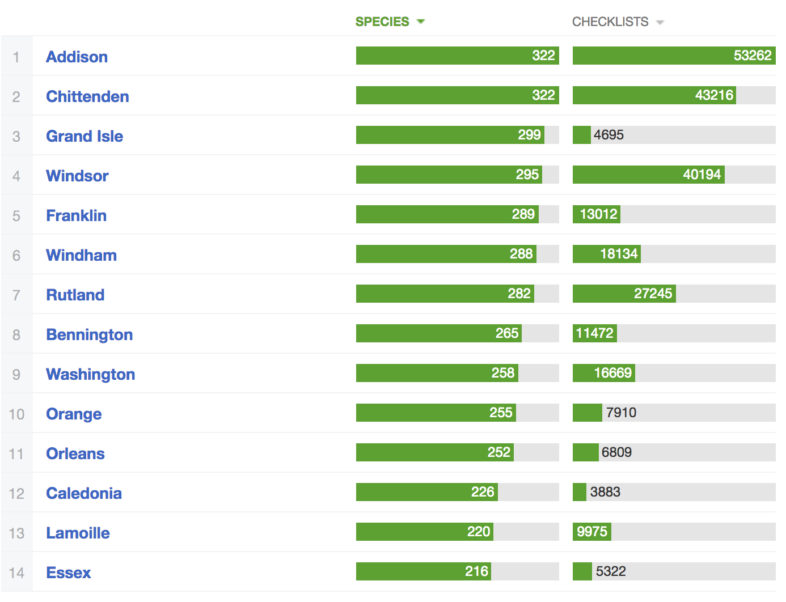
All-time tally of bird species and complete checklists by Vermont county. Click on the image to visit Vermont eBird to explore each county.
Individual County Winners
Awarded to the birders with the most checklists for each county and to the birders with the highest species count for each county. No par or weighting necessary for this one!
Visit the Vermont eBird Top 100 list to get a full tally of Checklist and Species List Champions for any year. Simply select the county you are interested, then on the next page select the year you would like to see in the upper right corner.
STATEWIDE WINNERS
Many birders ventured outside their home county of course. Jim Mead continued his dominance in total species observed with a record 266 species, followed by Allison Wagner (257) and a tie for third with Zac Cota and Eddy Edwards (254). Ian Worley continued his amazing effort by submitting a remarkable 2,602 complete checklists. Craig Provost placed second (2,096), followed by Jim Mead (924).
THE COUNTY 150 CLUB
eBirders who identified 150 species or more in a county are inducted into the prestigious “150 Club”. Even in counties with higher avian diversity, a birder must be dedicated and in the field during all four seasons to join this club. Check out the 150 Club honor roll to see how you and your birding friends have done.
Two remarkable birders, Fred Pratt and Craig Provost, now have just 3 more counties each to be the first to attain 150 species in at least one year in all 14 counties. Overall, 104 individual birders have joined the elite 150 Club in at least one county since the Vermont County eBird Quest began in 2011.
The Vermont 250 Club
The Vermont 250 Club requires even more dedication. This is a list of eBirders that have found 250 or more bird species in Vermont during one calendar year and reported them to Vermont eBird.To complete this, birders have to find about 90% of the species found in Vermont in any given year! Jim Mead, the sole member, has passed 250 species 6 times in the last 7 years! This year, for the first time, five other birders join him.
Jim Mead (2011, 2012, 2014, 2015, 2016, 2017)
Zac Cota (2017)
Eddy Edwards (2017)
Bill Mayville (2017)
Mae Mayville (2017)
Alison Wagner (2017)
You can see the entire ranked list for each year by visiting the Vermont eBird Top 100.
RARE AND OUT-OF-SEASON BIRD OBSERVATIONS
Vermont eBirders also contributed many records to the Vermont Bird Records Committee (VBRC). The 37th annual report of the VBRC covered the evaluation of 46 records involving 28 species and 3 subspecies or ‘identifiable subspecific forms’. Forty records were accepted (87%) with the majority decided unanimously. There were no first state records for any species during this period. The first fully documented subspecies record for Northern Red-tailed Hawk (Buteo jamaicensis abieticola) observed in Springfield, Vermont and two Eastern Willet (Catoptrophorus semipalmatus semipalmatus) at the mouth of Charcoal Creek in Swanton, Vermont were accepted. The first breeding record of Hooded Warbler (Setophaga citrina) was accepted with a male well documented carrying food and then feeding a fledgling in Hinesburg, Vermont by several observers (see below for more details).
Thayer’s Gull (Larus thayeri) was merged into the same species as Iceland Gull (L. glaucoides) by the American Ornithological Society Committee on Classification and
Nomenclature—North and Middle America, decreasing the official Vermont State Bird Checklist to 387 species, representing 22 orders and 62 families of birds, including one extinct species (Passenger Pigeon [Ectopistes migratorius]), two extirpated (Loggerhead Shrike [Lanius ludovicianus] and Henslow’s Sparrow [Ammodramus henslowii]), six hypothetical occurrences, and nine introduced species. With the addition of Hooded Warbler as breeding in 2017, there have now been 203 species found breeding in the state. The checklist can be viewed and downloaded at https://vtecostudies.org/wildlife/wildlife-watching/vbrc/bird-checklists/.
Congratulations to everyone for a fun year of birding! We hope some of you will vie for top honors in 2017. You can follow the scoreboard all year long and see where you rank. Even if you come up short, all of the data collected in Vermont eBird is valuable for science, education, and conservation. Good luck eBirding in 2018!
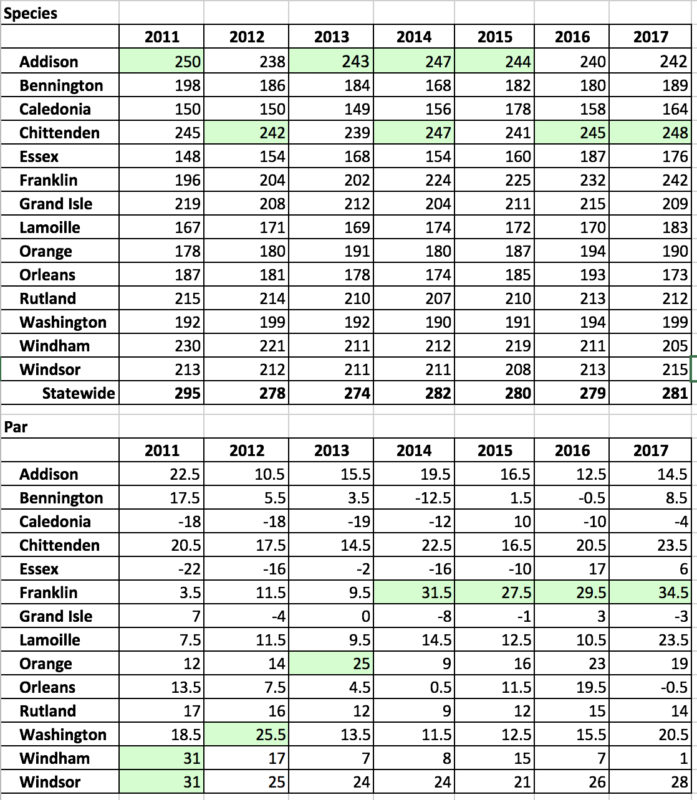
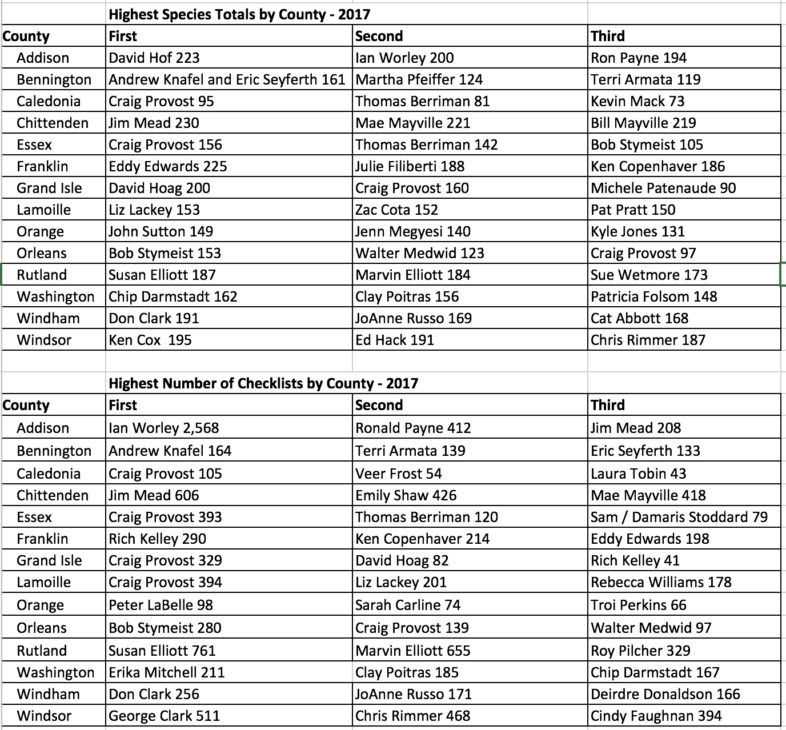
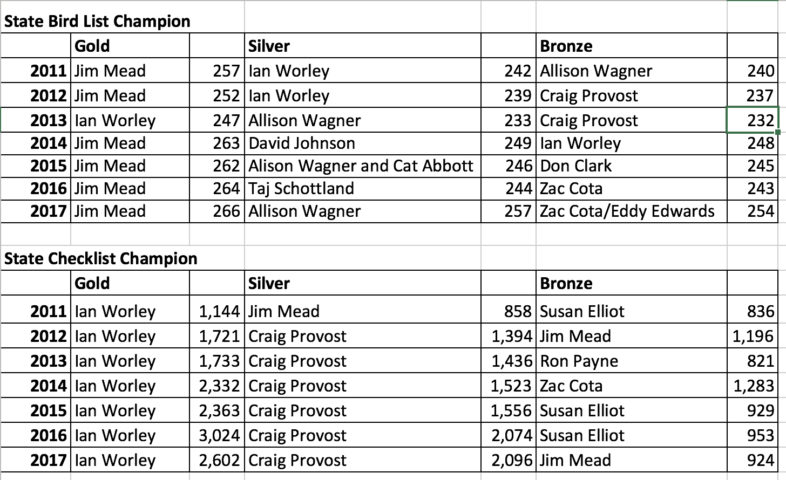

Wow, you have some dedicated birders. Way to go Vt.